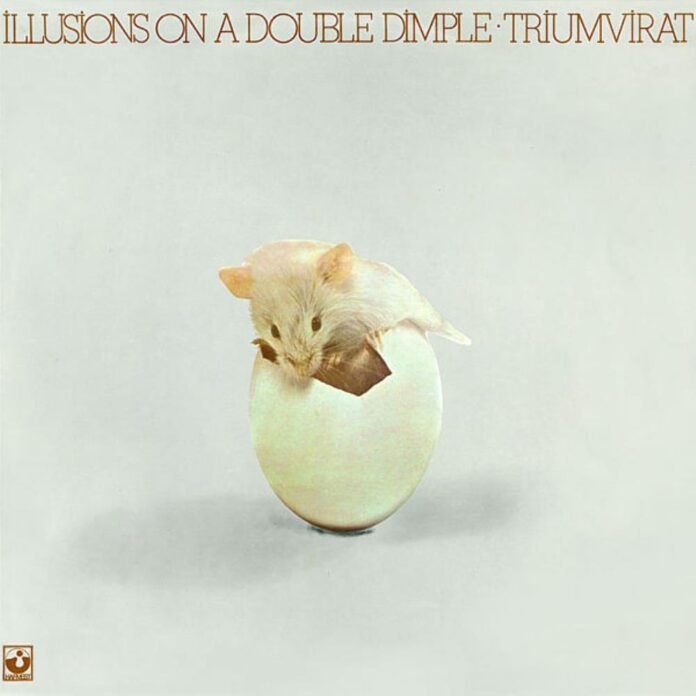I have to thank my old friend Greg for turning me on to the German progressive band, Triumvirat. And boy, have I always been glad he did. Progressive rock is a sub-genre of rock. One sub-genre progressive rock is Krautrock, which was what Triumvirat played. Also called “Kosmische Musik” (translated from German: “cosmic music”), Krautrock was birthed in West Germany during the tail end of the 1960s. This form of prog-layered psychedelic rock was fueled by electronica, rendered in long, avant-garde compositions. Quite often the songs employed machine-perfect arpeggiation (also called ‘hypnotic’ and ‘throbbing’) rhythms, as much created by early tape machine experimentation as synths. Bands from this school of music include Can, Ash Ra Tempel, Kraftwerk, and Tangerine Dream, to name just a few.
But Triumvirat is an unusual band working within this genre as they don’t so much adopt the pulsating rhythms used in typical Krautrock, or at least they don’t to the extent bands like Kraftwerk or Tangerine Dream do (Tangerine Dream provided the kinetic sexy soundtrack to the mega-hit movie Risky Business — notably in that infamous scene where Tom Cruise and Rebecca DeMornay do it on the choo choo). Instead, they stuck more to an Emerson, Lake, and Palmer approach. In fact, the band, a trio of musicians led by keyboardist Jürgen Fritz, were often compared to ELP. And while I admit that Fritz’s organ and synth sounds are very Emersonian, his playing and the band are their own entity.
Illusions of A Double Dimple, Triumvirat’s sophomore release, was their breakthrough. In fact, it earned the band an opening slot on Fleetwood Mac’s U.S. tour of 1974, introducing the Cologne Germany trio to a worldwide fan base. Their next album, Spartacus is often regarded as their high-water mark of playing matched with popularity. I agree it’s a damn good concept album, though Illusions works better for me.
Even this early in Triumvirat’s career, they had already endued some personnel changes. After releasing their first album, Mediterranean Tales, in 1972, bassist and vocalist Hans Pape officially left the band, although he does play and sing on the first side of the album. The two remaining members, drummer Hans Bathelt and Fritz, returned to the studio with guitarist, bassist, vocalist Helmut Köllen and spent six months recording Illusions On A Double Dimple. Enlisting the talents of horn players, a string quartet, and choir, Triumvirat were undeterred by the lackluster success of their last studio album — their debut — shouldering on with even more bombast, expense, and fear to their label.
Illusions On A Double Dimple employs jazz, classical, ballads, and deep groove organ-led rocking. The album is split one conceptual suite to a side, with nearly 24 minutes taken up by the six parts of the album’s title track. Just under one minute of opener “Flashback” is Fritz playing some beautiful Steinway grand piano under a high warble of Köllen’s vocal opening the tale. Then we get some piano harp flicks (akin to “Take a Pebble” by ELP) and the snapping beat of very trembly bass and piano arpeggios. Then organ and drums come in to drive the main melody of next song, “Schooldays.” The backing vocalists come in here for the first time as Fritz floats in some Moog lines with his organ. This section ends on a dime, and we get Fritz piano trilling again, with some sailing single lead lines to bring us into “Triangle.”
Yes, this is where you could make the ELP comparisons as Fritz manages piano plodding with Bathelt and Pape as they keep a simple rhythm to his layered synth leads floating atop…at least for the beginning of the tune. Then, at about the three-minute mark, Bathelt begins an assault on snare and tom that counters the complete frenzy of Fritz’s organ runs, some string spikes and the occasional quick breaks of “Ah’s” reminding me of similar moments at the beginning of Yes’ “Close To The Edge.”
Triumvirat will employ this again on the second side. The band rides a central theme at the four-minute mark. Still, mostly it is Bathelt’s moment wailing to a spoken moment of the narrator admitting he was “sacked last Friday,” then we get into a dark piano slower passage of “Illusions,” and more of that odd snapping from Bathelt (which quick frankly does not work so well in this halting darker moment). The chorus and keys rise around the minor chords and the narrator’s melancholy over losing his job, but this doesn’t last long as we get into the full pop beat and main organ melody of “Simplicity.” Yes, the bass is still too trembly for my tastes, reminding me of the unfortunate sound Greg Lake wrestled from his eight-string Alembic “Scorpion” bass on Emerson, Lake & Palmer In Concert. More lower end would have balanced out nicely between all the drum snapping and organ wailing, but the backing “nah nah’s” and drive of the whole concoction changes things up nicely enough. The piano break in the bridge sounds very Beatlesque. More “nah nah’s” slip in at the end into that trilling piano again, single synth lines and bass into big hits of everything thrown at the wall as all the melodies reload into “Last Dance.” Fritz certainly makes the case that his band is following an organ-led prog trio tradition, and one can’t help but notice how truly fleet of finger he is.
If you thought you had enough piano trilling, organ wailing, snapping snares, and “ahh’s,” wait until you get the full-frontal opening of the second side, the wry telling of “Mister Ten Percent.” Köllen’s manning bass, acoustic, electrics, and vocals here, across some very wild and often slightly longer-than-need-be jamming.
Very much like Nectar’s Recycled, the first side of Illusions On A Double Dimple has more cohesiveness to its concept, while the second side is not as tightly rendered. Nevertheless, this entire album sports some great songs and brilliant performances, plus a full realization of both The Cologne Opera House Orchestra and horns from the Kurt Edelhagen Brass Section on this side.
“Maze” gets us going with Fritz’s wild piano runs, those Yes-like “ahh’s” full stops, and again Bathelt rolling round his drums to set the central theme. Two minutes in, things get darker after a big synth-stopping sweep, and we get a full piano drop-off into “Dawning.” After some pretty piano trilling on the higher octave, there comes the growly over-the-top vocal and snap of staccato drums of “Bad Deal.” There are as much slicing strings here as a jazzy section sax solo, then we are into a few squishy synth lines bringing the “Roundabout” section to the fore.
Here is lots of organ and drum interplay, and although masterfully played, I find it doesn’t have much of a purpose beyond showing off the bands’ dexterity. But there is a bass solo moment where it sounds as if the loose strings might just fly off at any second, which I love, especially seeing how it gives the listener a much-needed break from all the jamming. We are all too soon back to the two main melodies via organ interplay, where again, things go on longer than they need.
“Lucky Girl” is interesting, first rendered by a strummed acoustic. Sure, I don’t need to make any more comparisons to ELP or other prog when it comes to this band, let alone do I need to remind one they named another song here “Roundabout.” But Fritz and company are obviously playing this tune tongue-in-cheek, the song closely named after you-know-what ELP classic as well as the single synth line reminiscent of ELP’s big first hit. Köllen’s vocal here is especially spot on, his best here actually, singing straight as he is and not adopting a growly character. But once again I feel, Triumvirat drags the tune out a little longer than need be.
Fritz takes his time modulating his organ down to “Million Dollars,” the last part of “Mister Ten Percent.” This is where the orchestra and horns really come in, the backing vocals too, and although, once again, nobody here seems able to get out of their own way enough to have edited this down, this is top-notch prog playing of the era. Things smash to a rather abrupt conclusion.
Wrung out from all the speedy playing, the over-the-top drumming, a thick concept plodding across each side, and Fritz’s flying fingers, I will admit Illusions On A Double Dimple is a heavy listen. But it is one worth your time, as is diving deeper into Triumvirat’s other releases as well as the wide range of bands that fall under the Krautrock genre still making music today.
~ Ralph Greco, Jr.




















